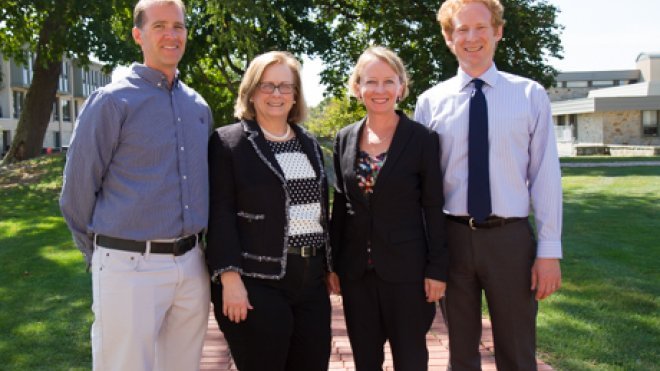National Science Foundation Awards $1 Million to RWU
Four professors secure grant to study impact of Science Communication on retention, graduation and placement in STEM fields

BRISTOL, R.I. – Professor of Biology Brian Wysor, Associate Professor of Engineering William J. Palm, Center for Student Academic Success Associate Director Karen Bilotti, and Science Center Coordinator Tracey McDonnell Wysor were awarded a $999,999 grant from the National Science Foundation to offer scholarships and provide training to academically talented, low-income undergraduates pursuing Science, Technology, Engineering and Mathematics (STEM) majors at RWU.
“The team that will lead this project brought the classroom expertise of the faculty together with the skill of the student support staff to develop a premier program for increasing the success of low-income students in STEM fields,” RWU Interim President Andy Workman said. “They are true leaders in achieving our University’s core purpose of serving society through engaged teaching and learning.”
The National Science Foundation’s Scholarships in Science, Technology, Engineering and Mathematics (S-STEM) program is providing the grant for the project, titled “Engaging Undergraduates in Science Communication: A program to graduate STEM professionals into Research and Industry in Science and Engineering (RISE).” The foundation chose the program from among some 500 proposals, with reviewers highlighting the novelty of the research that will investigate the impact of Science Communication as a way to foster students’ STEM identity and persistence in the field.
RISE scholars will receive four-year partial tuition scholarships and receive training through coursework, research and internship opportunities. They will, for example, use #speakingSTEM, a deliberate practice of communication using social media, to emphasize STEM issues that matter to individuals and to society.
“Through a combination of well-established high-impact practices and this grant’s Science Communication focus, we will produce well-educated STEM graduates who can contribute to a growing science and engineering-based economy in Rhode Island and beyond,” the RWU investigators said. “RWU’s priorities and strengths in emphasizing research along with other experiential learning opportunities will be invaluable in connecting students to the practical application of academic work and providing them with meaningful pathways to internships, careers or graduate study, motivating degree attainment.”
“Hats off to Roger Williams University for winning this competitive NSF grant to boost the number of STEM scholars studying here in Rhode Island,” said U.S. Sen. Jack Reed, a senior member of the Appropriations Subcommittee that oversees NSF funding. “We need to continue making smart investments in growing our STEM workforce. These scholarships will enable more high-achieving, deserving students with financial needs to pursue these critical fields and get a world-class education right here at Roger Williams University.”
“Roger Williams has made great strides in opening up science and engineering learning to exceptional students of all backgrounds,” U.S. Sen. Sheldon Whitehouse said. “This federal support will help them carry on that work. I'm especially excited about the school's plans to use this grant to teach students how to more effectively communicate important scientific concepts to the public.”